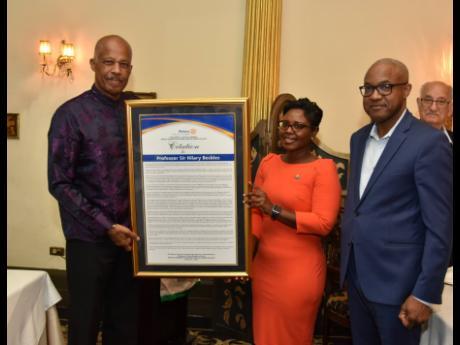‘The time is now’
Sir Hilary Beckles calls for a revolution of the educational system
Vice chancellor of The University of the West Indies, Sir Hilary Beckles, declared on Tuesday that “the time is now” for a revolution of the educational system in Jamaica.
He was speaking at the Terra Nova All Suite hotel in St Andrew, where the Rotary Club of St Andrew presented him with the Orville Walker Vocational Service Award.
In his remarks on the topic, ‘the philosophy of public service’, the professor stated that it was his wish for every Jamaican child to have an environment to grow, to be invested in as social citizens and to be treated as equals. He noted that “Jamaicans are among the most energetic, creative, imaginative people on God’s Earth, and you see it every day”.
He continued, “What we need is a chance for the children to actualise that in large numbers,” stressing that if it were not facilitated, it would be an injustice to the nation’s future and its children.
Each year, the Orville Walker Award is given to an individual who has demonstrated remarkable professional achievement while upholding high ethical standards.
Nicole Gordon, president of the club, said that “the Orville Walker Vocational Service Award recognises someone whose personal life may be regarded as a model to our vulnerable and impressionable young people and who has displayed the high ethical standards which characterise Rotarians”.
Professor Beckles has been the vice chancellor of The UWI since 2015. Prior to that, he served as professor of economic history, principal and pro vice chancellor of The UWI’s Cave Hill campus in Barbados for 13 years.
During his address, Beckles stated that he did not initially set out to become a public servant. He praised his grandmother, a Pentecostal preacher who nurtured him in his native Barbados, for establishing in him a “very strong moral, ethical, and religious foundation”.
He said that even as a 14-year-old boy, he had already developed a solid sense of social justice, particularly as a result of his life experiences after later going to live with his parents, who were part of the Windrush generation — Caribbean natives who immigrated to the United Kingdom between 1948 and 1971.
“What I recalled is that within a matter of a month or two, I had a very clear sense of the injustice perpetrated against the West Indian people,” Beckles said which led him to become an advocate in the Birmingham area, participating in rallies, marches and protest in his teenage years.
Beckles came to Jamaica at the age of 24 where he then began his teaching career at the Mona campus and was already involved in several international campaigns surrounding social justice.
Speaking of his personal philosophy, Beckles said that he viewed the values of nurturing, caring, justice, equality, fairness and moral conduct as top priority.
“That has been the basis of my own philosophy of service: how do we push our people away from the colonial scaffolds achieved at economic development we need at the basis of our societies, but we also built on the principles of social justice,” he said.
“I am instinctively repelled by injustice. In Jamaica, this country that is my home, I continue to feel the pain of seeing the children, the working-class children of this nation not getting the start in life that they are entitled to,” he said.
Speaking of his own experiences of travel across the island in both urban and rural communities, Beckles acknowledged that the realities remained “the core” of his anxieties given the needs within the education sector.
Beckles serves on many United Nations committees and advisory panels. He was called upon by secretary-general Ban Ki-Moon to serve as an inaugural member of his science advisory board on sustainable development. He also served as an advisor to the United Nations Educational, Scientific and Cultural Organization (UNESCO’s) cities for peace global programme, and was an advisor to the United Nations world culture report.
For many years he was a lead conceptualiser of UNESCO’s Slave Route Project, and currently serves as its vice president. He is also a member of UNDP’s Advisory Panel on the Caribbean Human Development Report.
Beckles has published over 100 peer reviewed essays in scholarly journals, and 12 books on subjects ranging from Atlantic and Caribbean history, gender relations in the Caribbean, sport development and popular culture.
Beckles is also the chairman of the Caribbean Examination Council.

